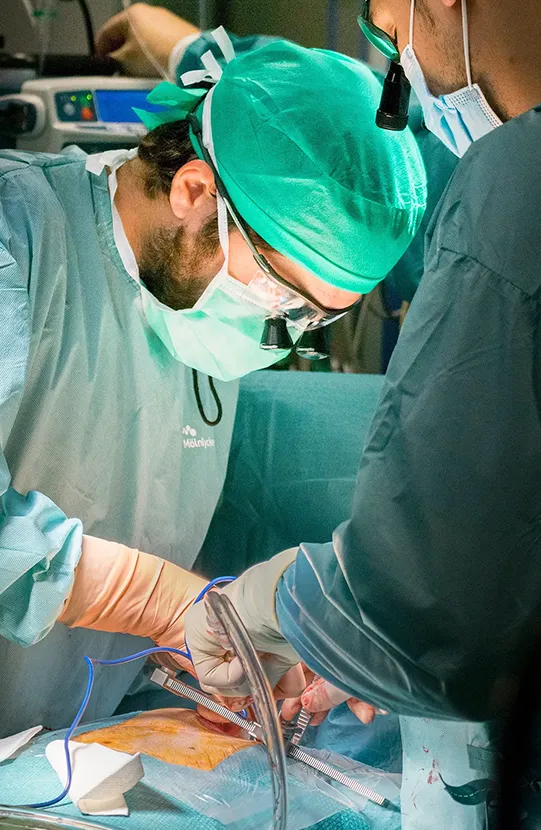Aortic valve surgery
Cirugía Cardiaca

Aortic valve surgery
What is the aortic valve?
The passage of the blood of a cardiac chambers to the other is done through the valves of the heart. Its function is to allow the blood to be opened, and to prevent the recoil of the same at the close.
The aortic valve is one of the 4 valves in the heart has. This separates the left ventricle from the aorta. When the operation of the same is not correct, it may be necessary for the surgical intervention on the valve.
When is it indicated an aortic valve surgery?
When there is a pathology affecting the normal operation of the valve. As congenital conditions such as bicuspid aortic valve, or diseases such as aortic stenosis.
These conditions can interfere with the blood flow and force the heart to work with greater effort to provide the same flow rate into the bloodstream.
What patients may benefit from surgery of the aortic valve?
Currently, patients who are operated from heart problems in the aortic valve are a result of a congenital abnormality (bicuspid aortic valve) or a degeneration senile valve for the aging.
Severe aortic stenosis in elderly patients is very rare and has poor prognosis with medical treatment. The mortality rate reaches 25% per year and 50% within two years of the onset of symptoms.
The current results of the surgery on the aortic valve in terms of morbidity and mortality are very poor, due to the specialized surgical, to the selection and indication of surgery in an increasingly early, or to the addition of new surgical techniques.
What surgical techniques can be used in surgery of the aortic valve?
TAVI
In addition to the development of minimally invasive surgery, in recent years it has incorporated a new technique for the treatment of the disease on the aortic valve.
This is the implant of valves transcatheter (TAVIs). Currently presented as a very good option for patients who are considered high risk for surgery or patients of advanced age.
It is a technique in which the diseased valve is not replaced, but the prosthesis is deployed within the same, and brought up there sailing through an artery using a catheter.
What is the advantage of the Implant Valve Transcatheter?
- It is not necessary to stop the heart of the patient to the intervention
- It is not necessary to make an incision through the sternum
- It is not necessary to use extracorporeal circulation during surgery
What results can I expect from an Implant Valve Transcatheter?
The results have been very satisfactory, although it is a technique indicated to patients with certain conditions, such as advanced age or high surgical risk due to some issues that are not resolved completely, as the neurological complications, persistence of leakage paravalvulares significant or vascular complications and high cost of these prostheses.
Valve without suture
It is another alternative to conventional valves, and the valves, transcatheter.
These new valves allow you to operate these patients, high-risk, safely and with long-term results are more contrasted.
Currently, the combination of cardiac surgery, minimally invasive, along with the use of the valves without suture, are likely to be the option with more advantages in the short and medium term in selected patients.
Its main advantage lies in the security of the result in the operation of the valve once implanted, the speed of the implant, significantly decreases the surgical time and the results in general well-contrasting long-term.

QUERY
Take care of your heart
Contact us for a personalized consultation. We are here to help you improve your heart health with the more advanced therapies.


